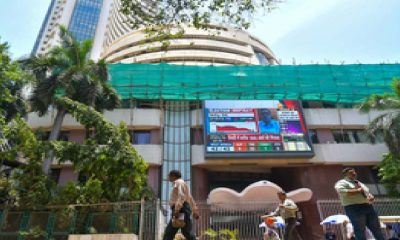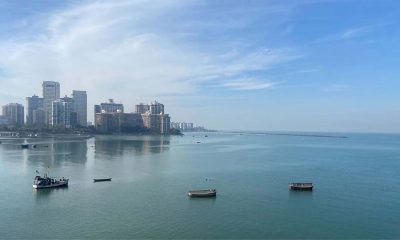National News
Photo of BJP’s 1996 National Executive, held in Bhopal office razed last week, surfaces
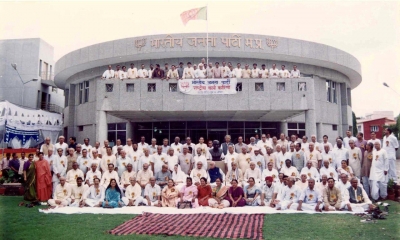
While the Bharatiya Janata Party’s (BJP) two-day National Executive meeting began in New Delhi on Monday, with Prime Minister Narendra Modi and other top leaders discussing strategies for the Assembly and next Lok Sabha elections, a photograph of the same meet held in the Madhya Pradesh capital in 1996 has surfaced on social media.
The photograph showing Prime Minister Atal Bihari Vajpayee, flanked by his deputy L.K. Advani on his left and veteran Vijaya Raje Scindia on his right, and other senior leaders like Sushma Swaraj, Uma Bharti, and Kalyan Singh at the BJP headquarters in Bhopal.
But while these leaders are seen either standing or sitting on chairs in a row on the ground floor, but one of the persons present on the balcony maked the photograph more special in the present context. Because, this person is none other but Prime Minister Narendra Modi.
The photo was shared on Bharatiya Janata Yuva Morcha’s (BJYM) official Twitter handle, and several individuals, including BJP leaders and journalists, also shared it photograph with captions.
This photograph was taken after the concluding session of the 1996 National Executive meeting and in the subsequent 27 years, a lot has changed within the BJP itself. But, what is another important note of this photograph is that the BJP headquarters – ‘Deendayal Upadhyaya Parisar’ in Bhopal, where the meeting was held, was demolished just a few days back.
Now, the BJP unit has decided to build a multi-storey party headquarters equipped with high-tech facilities, and this is expected to be ready by next two years. Till then, the party has shifted into a temporary office on government land near Rani Kamlapati Railway station, Bhopal.
Some senior BJP leaders had opposed the decision of demolishing the party headquarters that was built in during the period of then Chief Minister Sundarlal Patwa in 1991. Former Rajya Sabha member Raghunandan Sharma had even written to the party President J.P. Nadda, requesting him to intervene in the matter, but the demolition went ahead.
Business
IndiGo disruptions may cause revenue loss, penalties to company: Report
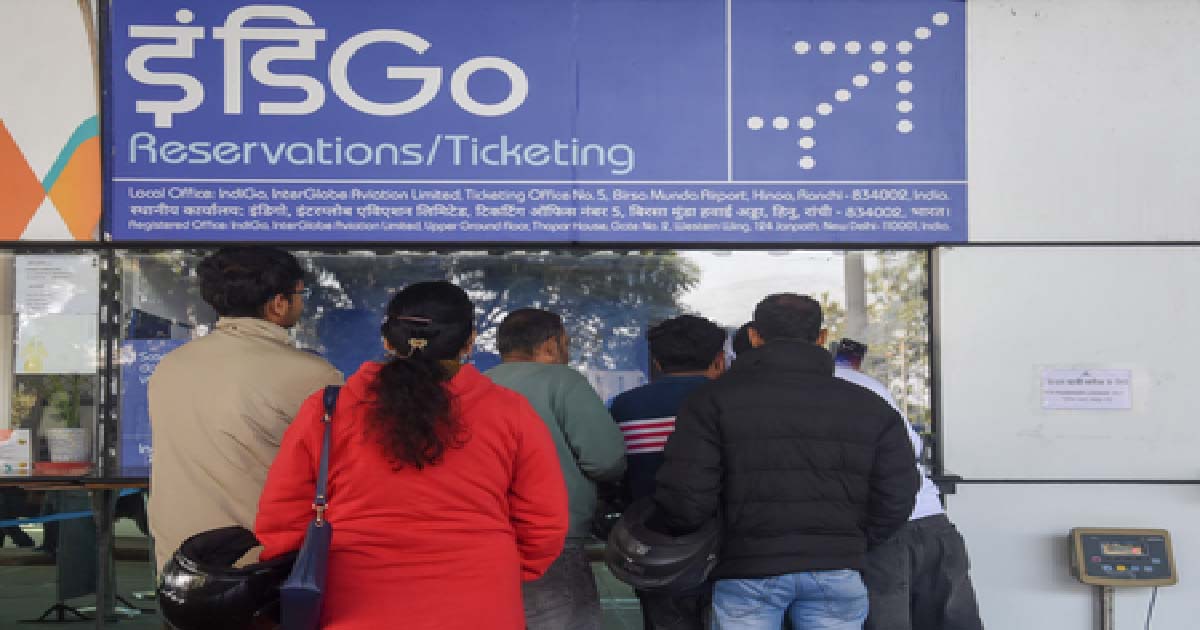
New Delhi, Dec 8: Widespread flight disruptions at IndiGo are credit negative, and refunds and compensation could cause it “significant financial damage”, credit rating agency Moody’s warned on Monday.
In a note, Moody’s said that regulatory penalties from the Directorate General of Civil Aviation (DGCA) remain possible as the airline failed to plan for aviation rules communicated over a year earlier.
The crisis struck as the airlines entered their peak winter schedule, with “significant lapses in planning, oversight and resource management” as the Phase 2 of the Flight Duty Time Limitation (FDTL) rules were introduced on November 1, 2025, after being communicated more than a year earlier, it noted.
The rules reclassified midnight–6 a.m. duties as night duty and cut permissible landings in 24 hours from six to two or three. The agency said that IndiGo’s lean operating model lacked resilience to integrate the change, forcing a system‑wide schedule reset.
Over 1,600 flights were cancelled on December 5, and over 1,200 were grounded in November, with cancellations beginning on December 2. Moody’s said IndiGo is yet to fully restore normal operations.
IndiGo said it was set to operate over 1,800 flights on Monday, up from 1,650 on Sunday, adding that more than 4,500 bags have been delivered to respective customers, and “we are on track to deliver the rest in the next 36 hours”.
The airline said it expects a return to full schedules by mid-December, adding that it is working “round the clock” to normalise operations.
It has so far refunded Rs 827 crore to affected passengers, and the rest is under process for cancellations up to December 15.
Union Civil Aviation Minister K. Rammohan Naidu said in the Parliament on Monday that the government has initiated a thorough inquiry into the matter.
“IndiGo was supposed to manage the crew and roster…We will take strict action. We will set an example for every airline. If there is any non-compliance, we will take action,” he said on the floor of the Rajya Sabha.
Crime
Palghar Crime: 40-Year-Old Constable Arrested For Allegedly Raping Woman Inside Kasa Police Station

Palghar, Maharashtra, Dec 08: A 40-year-old police constable has been arrested for allegedly raping a woman inside the Kasa police station in Maharashtra’s Palghar district, officials said on Monday.
According to a senior official from the Palghar rural police, the incident took place last week when the woman had visited the station to record her statement in connection with an ongoing case. The constable allegedly assaulted her within the premises.
Following a complaint filed by the woman, a case of rape was registered and the constable was arrested on Sunday, officials confirmed.
In the aftermath of the incident, the in-charge of the Kasa police station has been transferred. Further investigation is underway.
National News
PM Modi recalls how Vande Mataram defied British oppression, stood ‘like a rock’
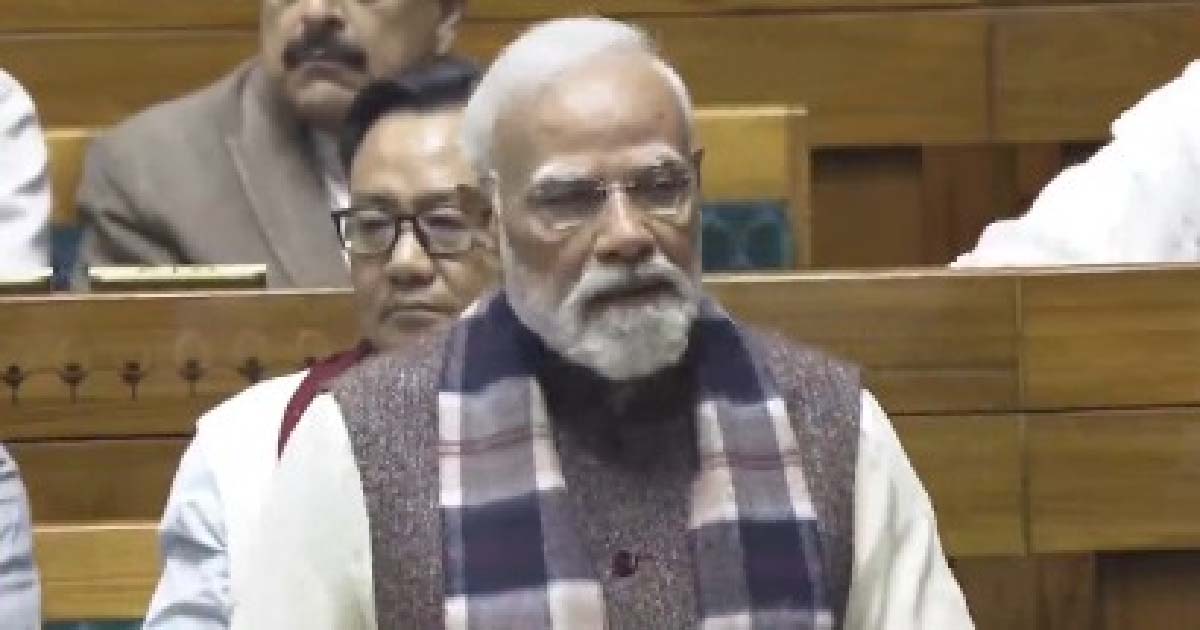
New Delhi, Dec 8: Prime Minister Narendra Modi, on Monday, invoked the enduring spirit of ‘Vande Mataram’ while initiating a day-long discussion in the Lok Sabha to mark the 150 years of the national song.
He described it as a hymn that stood “like a rock” against British oppression and continued to inspire unity across generations.
Tracing the song’s journey from its composition by Bankim Chandra Chattopadhyay in 1875 to its role in the freedom struggle, PM Modi said ‘Vande Mataram’ became a current of emotion that bound the nation together.
“Even when crises like the coronavirus pandemic struck, the spirit of ‘Vande Mataram’ continued to connect the country. Today, as we march towards an ‘Atmanirbhar Bharat’ (Developed India), this hymn remains a source of strength,” he noted.
The Prime Minister quoted Mahatma Gandhi, who had described ‘Vande Mataram’ as a song that united the nation.
“Pujya Bapu (Mahatma Gandhi) said ‘Vande Mataram’ connects us. It is the dream of today’s generation to build a prosperous India, and this song continues to inspire that vision,” PM Modi said.
He emphasised that the hymn was more than just words — it was a mantra of sacrifice, resilience, and unity.
From the days of colonial bans, when people were punished for speaking or printing the words, to the sacrifices of countless freedom fighters who embraced martyrdom with ‘Vande Mataram’ on their lips, the song has remained a symbol of defiance and hope.
PM Modi urged the Parliament to ensure that the legacy of ‘Vande Mataram’ is preserved and passed on to future generations.
“This is not just a tribute to history but a reaffirmation of our democratic spirit. The lessons of the past must continue to guide our future,” he said, adding that the 150th anniversary was an opportunity to restore pride in a hymn that has been the heartbeat of Bharat.
Initiating a day-long discussion on 150 years of ‘Vande Mataram’ in the Lok Sabha, PM Modi noted that ‘Vande Mataram’ stood like a rock and inspired unity despite British oppression.
“When ‘Vande Mataram’ completed 100 years, the nation was chained by the Emergency. At that time, the Constitution was throttled and those who lived and died for patriotism were pushed behind bars,” he said.
“The Emergency was a dark chapter in our history. Now we have the opportunity to restore the greatness of ‘Vande Mataram’. And I believe this opportunity should not be allowed to pass,” PM Modi added.
-

 Crime3 years ago
Crime3 years agoClass 10 student jumps to death in Jaipur
-

 Maharashtra1 year ago
Maharashtra1 year agoMumbai Local Train Update: Central Railway’s New Timetable Comes Into Effect; Check Full List Of Revised Timings & Stations
-

 Maharashtra1 year ago
Maharashtra1 year agoMumbai To Go Toll-Free Tonight! Maharashtra Govt Announces Complete Toll Waiver For Light Motor Vehicles At All 5 Entry Points Of City
-

 Maharashtra1 year ago
Maharashtra1 year agoFalse photo of Imtiaz Jaleel’s rally, exposing the fooling conspiracy
-

 National News1 year ago
National News1 year agoMinistry of Railways rolls out Special Drive 4.0 with focus on digitisation, cleanliness, inclusiveness and grievance redressal
-

 Maharashtra1 year ago
Maharashtra1 year agoMaharashtra Elections 2024: Mumbai Metro & BEST Services Extended Till Midnight On Voting Day
-

 National News1 year ago
National News1 year agoJ&K: 4 Jawans Killed, 28 Injured After Bus Carrying BSF Personnel For Poll Duty Falls Into Gorge In Budgam; Terrifying Visuals Surface
-

 Crime1 year ago
Crime1 year agoBaba Siddique Murder: Mumbai Police Unable To Get Lawrence Bishnoi Custody Due To Home Ministry Order, Says Report





